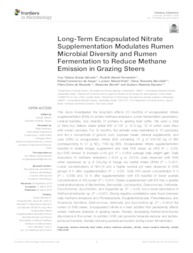Long-Term encapsulated nitrate supplementation modulates rumen microbial diversity and rumen fermentation to reduce methane emission in grazing steers.
Long-Term encapsulated nitrate supplementation modulates rumen microbial diversity and rumen fermentation to reduce methane emission in grazing steers.
Author(s): GRANJA-SALCEDO, Y. T.; FERNANDES, R. M.; ARAUJO, R. C. de; KISHI, L. T.; BERCHIELLI, T. T.; RESENDE, F. D. de; BERNDT, A.; SIQUEIRA, G. R.
Summary: This study investigated the long-term effects (13 months) of encapsulated nitrate supplementation (ENS) on enteric methane emissions, rumen fermentation parameters, ruminal bacteria, and diversity of archaea in grazing beef cattle. We used a total of thirty-two Nellore steers (initial BW of 197 15.3 kg), 12 of which were fitted with rumen cannulas. For 13 months, the animals were maintained in 12 paddocks and fed a concentrate of ground corn, soybean meals, mineral supplements, and urea (URS) or encapsulated nitrate (EN) containing 70 g of EN/100 kg of BW (corresponding to 47 g NO3/100 kg BW). Encapsulated nitrate supplementation resulted in similar forage, supplement and total DMI values as URS (P > 0.05), but ENS tended to increase (C48 g/d; P = 0.055) average daily weight gain. Daily reductions in methane emissions (- 9.54 g or 18.5%) were observed with ENS when expressed as g of CH4/kg of forage dry matter intake (fDMI) (P = 0.037). Lower concentrations of NH3-N and a higher ruminal pH were observed in ENS groups 6 h after supplementation (P < 0.05). Total VFA rumen concentration 6 h (P = 0.009) and 12 h after supplementation with EN resulted in lower acetate concentrations in the rumen (P = 0.041). Steers supplemented with EN had a greater ruminal abundance of Bacteroides, Barnesiella, Lactobacillus, Selenomonas, Veillonella, Succinimonas, Succinivibrio, and Duganella sp. (P < 0.05), but a lower abundance of Methanobrevibacter sp. (P = 0.007). Strong negative correlations were found between daily methane emissions and Proteobacteria, Erysipelotrichaceae, Prevotellaceae, and Roseburia, Kandleria, Selenomonas, Veillonella, and Succinivibrio sp. (P < 0.05) in the rumen of ENS steers. Encapsulated nitrate is a feed additive that persistently affects enteric methane emission in grazing steers, thereby decreasing Methanobrevibacter abundance in the rumen. In addition, ENS can promote fumarate-reducer and lactateproducer bacteria, thereby reducing acetate production during rumen fermentation.
Publication year: 2019
Types of publication: Journal article
Observation
Some of Embrapa's publications are published as ePub files. To read them, use or download one of the following free software options to your computer or mobile device. Android: Google Play Books; IOS: iBooks; Windows and Linux: Calibre.
Access other publications
Access the Agricultural Research Database (BDPA) to consult Embrapa's full library collection and records.
Visit Embrapa Bookstore to purchase books and other publications sold by Embrapa.

